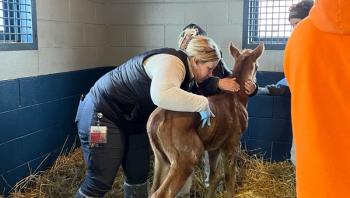
CVMA covets heightened legal status for pets
Sacramento, Calif.- The California Veterinary Medical Association (CVMA) supports creating a special property classification for pets that would allow, but limit, non-economic rewards in malpractice lawsuits concerning companion animals.
Sacramento, Calif.- The California Veterinary Medical Association (CVMA) supports creating a special property classification for pets that would allow, but limit, non-economic rewards in malpractice lawsuits concerning companion animals.
At presstime, CVMA awaits final go-ahead from its Board of Governors before submitting a bill to the state Legislature. The move comes as regional broker ABD Insurance & Financial Services releases projections showing veterinary malpractice claims would climb slowly due to the new cause of loss before leveling off.
To thwart excessive and frivolous lawsuits, CVMA's proposal specifies undisclosed caps on all non-economic rewards.
"There's already precedent in California to create this special class of property - the heirloom category," CVMA Executive Director Dr. Dick Schumacher says. "It provides owners the right to sue for emotional value.
"The economic status of pets will be raised one way or another; it's inevitable. Our position is that this is the most important issue facing the veterinary profession in 2004."
Debating the legal status of pets stirs fierce opinion among animal owners, lawmakers, attorneys and veterinarians. The United States' judicial system generally views animals as worth no more than property at the time of death. Yet one by one, America's courts are being challenged in malpractice and wrongful death cases to consider emotional distress and loss of consortium as a testimony to the human-animal bond. Larger damage rewards translate to increased lawsuits and higher malpractice insurance, which promise to alter how the country practices and pays for veterinary care.
Defending proactive approach
To ease the inevitable, Schumacher says the veterinary community must start "driving the bus."
"There are two schools of thought," he says. "One side opposes raising the status of pets at all costs. The other side sees it coming and wants to address it legislatively so it doesn't get out of hand with the animal lawyers.
"Even though the law doesn't allow for it, judges are moving to set a precedent. The bottom line is it's going to happen, in the legal arena or legislatively."
That's where the CVMA-proposed bill comes into play. It attempts to attach parameters along with a price tag to the human-animal bond in an effort to head off animal lawyers, owners and activists, says Dr. Bill Grant, chairman of the CVMA Non-Economic Recovery Taskforce.
About the bill
It also draws guidelines, Grant adds. While the anticipated bill recognizes an animal's emotional value, it asks questions concerning what types of cases the law pertains to; it defines the human-animal bond; it offers routes to determining who is attached to the pet and sets limits to what it's worth.
"There will obviously be issues, people we want to exclude from liability, such as animal shelters," he says. "If the status of pets changes in the legal arena, the likelihood of a reasonable cap, if any, is small."
"I've said for a long time veterinarians need to be part of this program and part of the solution. You need to jump on this bandwagon or watch the train leave."
Also watching the tide turn is Dr. Ed Branam, managing director of ABD Insurance & Financial Services, Inc. The Sacramento-based brokerage firm, providing 2,750 California veterinarians with professional liability insurance, recently summarized the impact economic value parameters might have on premiums should the worth of companion animals legally rise. The rate projections, derived from consultations with actuaries and legal experts, include three hypothetical scenarios with added severity of claims, factoring in the effects non-economic damages might have on traditional malpractice exposure.
Watching tide turn
The result: In the first three years there won't be much impact at all. (see Fact Box, page 38) That's encouraging, Branam says.
"We admit our findings are skewed from a geographic standpoint," he says. "But considering even a high amount of judgement costs, ABD projects premiums won't rise more than 150 percent."
ABD currently offers practitioners $1 million to $2 million policies for $188 a year. A 150-percent premium increase translates to about $400 annually.
"Obviously our findings are hypothetical and based on assumptions," Branam says. "No one has a crystal ball."
"But I still think we'll be affordable," he adds. "The human-animal bond is what's driving this profession's unprecedented growth. For anyone not to trade that for $400 a year would be insane."
Newsletter
From exam room tips to practice management insights, get trusted veterinary news delivered straight to your inbox—subscribe to dvm360.





